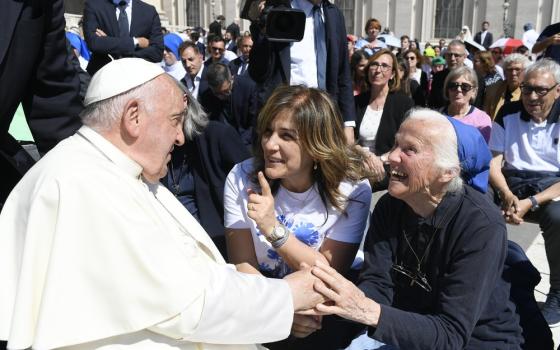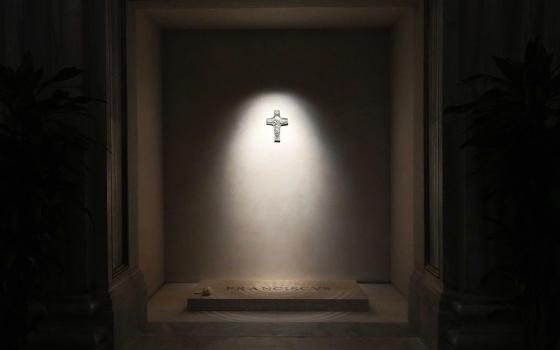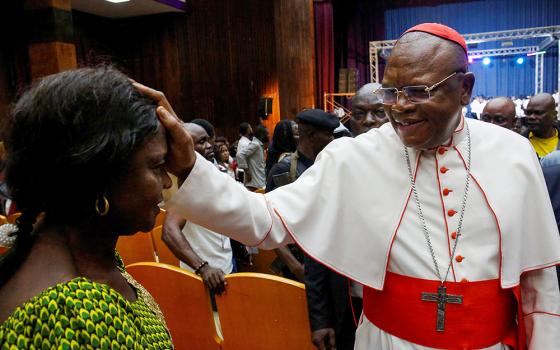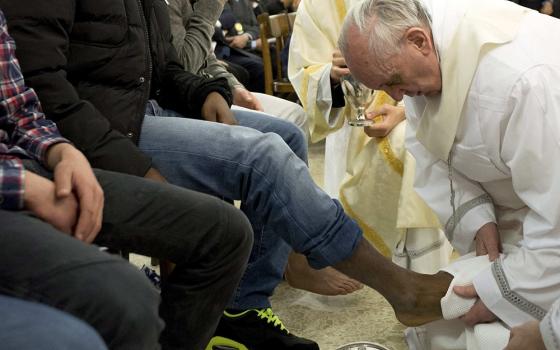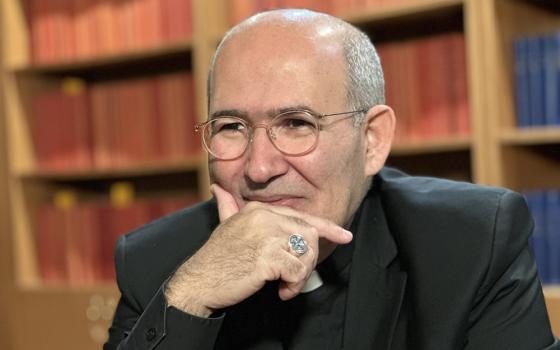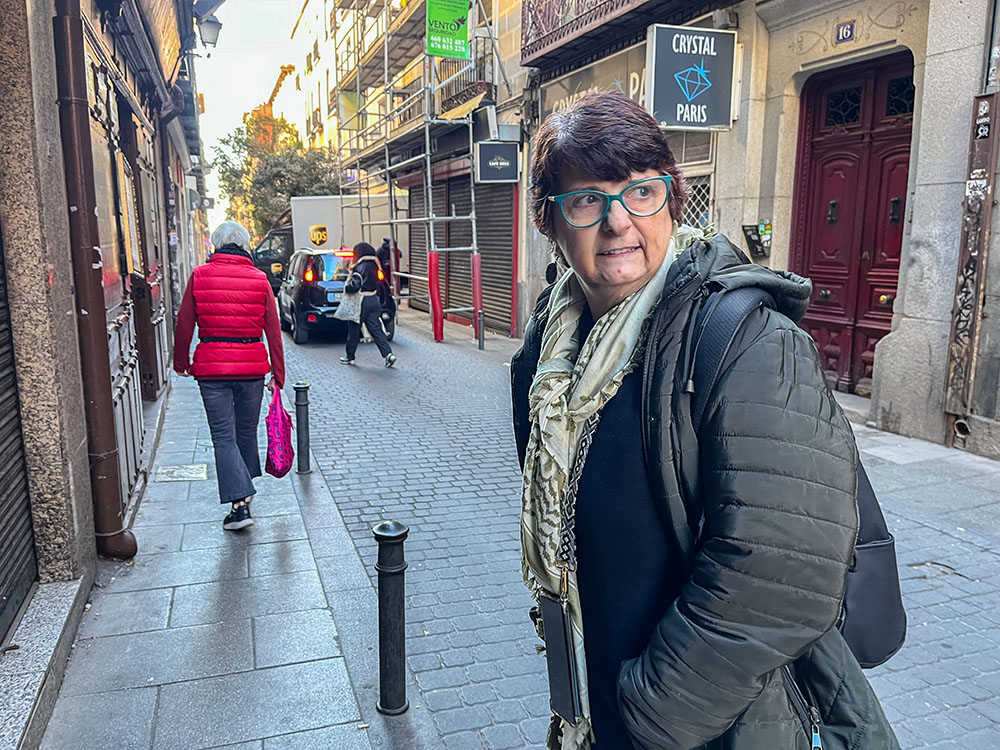
Sr. Pepa Torres, a member of the Apostolic Sisters of the Heart of Jesus, walks around the Lavapiés neighborhood of Madrid. "This neighborhood is a world where many different worlds fit," Pepa said. (Luis Donaldo González)
Just a mile from Madrid's city center is the barrio of Lavapiés, historically known for its social struggles, multicultural integration, and resistance to gentrification. In this neighborhood, Sr. María José Torres Pérez, or Pepa Torres as people know her, carries out her ministry among women, the impoverished and migrants.
"I live in Lavapiés because it is possible to meet the depths of humanity here," Pepa told Global Sisters Report as she walked through the barrio and greeted the neighbors. "Djeredieuf" — thank you in the Senegalese Wolof language — she said at the end of each conversation.
"This neighborhood is a world where many different worlds fit," Pepa told Global Sisters Report. “Here we also know the resilience of those who refuse to be devoured by unjust social systems."
In addition to being a renowned Spanish feminist theologian, theology professor and social activist, Pepa is a member of the Apostolic Sisters of the Heart of Jesus. "At the heart of my ministry are those who are not resigned to losing hope ... those who believe that another world is possible," Pepa said.
Due to increasing immigration in Spain, Lavapiés is one of the most multicultural and stigmatized neighborhoods in the country’s capital. "Here is Madrid’s migrant heart," she said.
"I go by the name of Pepa because African migrants couldn't pronounce my name," she explained. "Ellos me re-bautizaron" — "They re-baptized me."

Mohamed Fazle Elahi, founder of Asociación Valiente Bangla, talks with Sr. Pepa Torres outside the association's facilities. (Luis Donaldo González)
For the last 19 years, this name has represented her life mission. It symbolizes her social struggle alongside immigrants, especially those from Africa, Bangladesh and Latin America.
"With Pepa, I learned to struggle [for social justice]," said Mohamed Fazle Elahi, founder of Asociación Valiente Bangla, an association that advocates for the rights of Bangladeshis in Spain. "She always identifies where the problems are and stays with people to help. She is a [living] symbol of Lavapiés."
"She is Catholic, and I am Muslim, but we pray together," Elahi said. "Pepa is a gift that God, my Allah, has given me in my life."
"Jointly with others, we fight for the rights of migrants," Pepa said. "We struggle against the implementation of migrant raids, expedited deportations and for the closure of migrant detention centers."
Pepa's closeness to the social issues affecting women and immigrants led her to ally forces with others and found several civil associations, such as Senda de Cuidados or Path of Care, Red Interlavapiés or Inter-Lavapiés Network, and Territorio Doméstico or Domestic Territory.
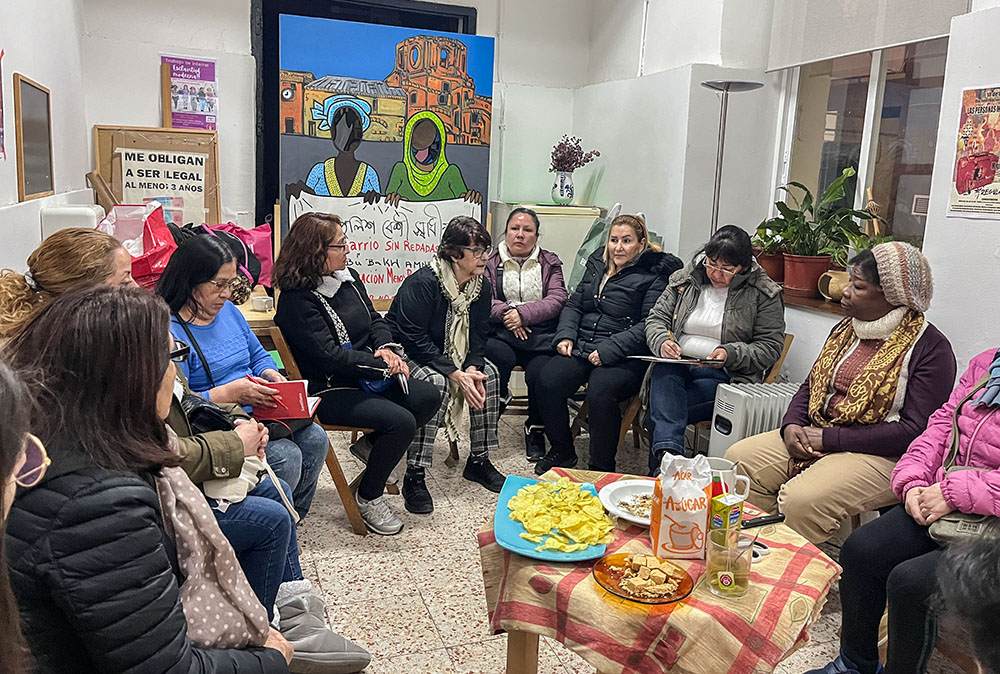
Women involved with the Territorio Doméstico association meet with Sr. Pepa Torres in January. (Luis Donaldo González)
"We founded Senda de Cuidados to offer dignified work to immigrant women and men in Madrid," Pepa said. "At Red Interlavapiés, we bring together locals and immigrants to fight against racism and social precariousness [or instability]."
"Women domestic workers are frequently victims of violence in their workplaces," she said. "We founded Territorio Doméstico to offer them support and professional legal advice."
For Bolivian immigrant Nilda Jiménez Vino, her arrival in Spain would not have been the same without Pepa's support. "When you arrive in another country, the process is challenging," she said. "Beyond the legal processes, Pepa showed me a caring and attentive face."
Since 2016, Jiménez Vino has been working as the Senda de Cuidados coordinator. From there, she can help dozens of families annually find dignified work in Madrid.
"Pepa is a different kind of religious sister," Dominican feminist activist and domestic worker Rafaela Pimentel Lara told GSR. "She is a revolutionary and rebellious sister.”
"The God that Pepa shows attracts me. He is a God who allows everyone to come closer to him. He is a God that nobody had shown me before," she added.
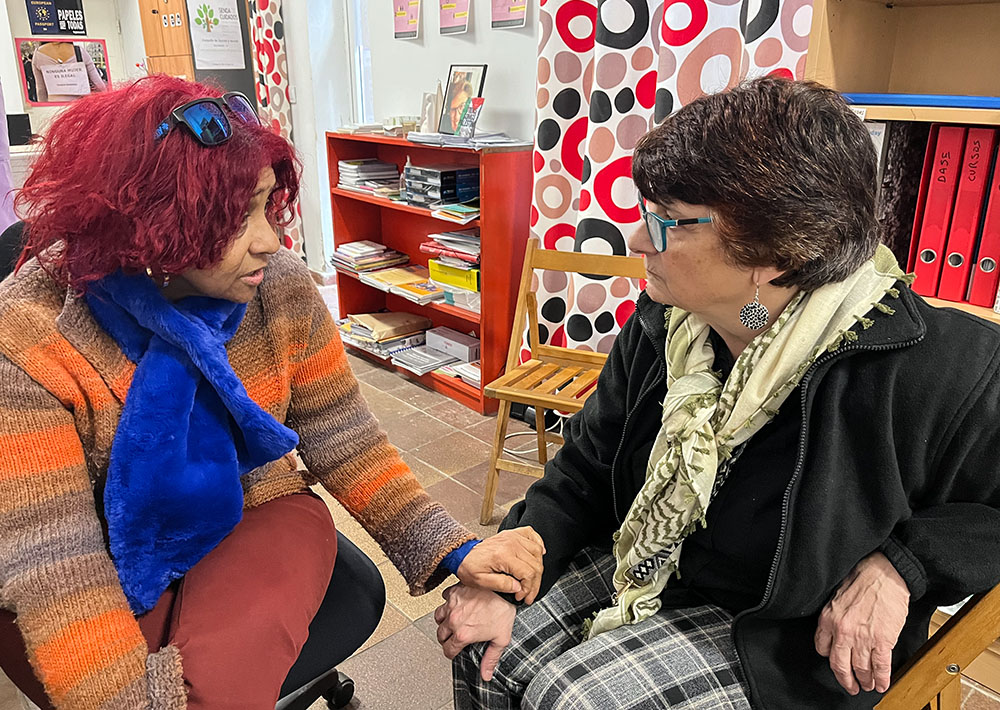
Dominican feminist activist and domestic worker Rafaela Pimentel Lara talks with Sr. Pepa Torres. (Luis Donaldo González)
Pepa has been strengthening the social and pastoral initiatives that favor the community development of those she serves in Madrid for over two decades.
"I truly believe in the power of community initiatives to drive social change," Pepa said. "We have to raise our voices and gritar [shout] to denounce injustices."
GSR: How do you live out your commitment to the women, the impoverished and the immigrants living in Lavapiés?
Pepa: I live my commitment by sharing my life with them. This means sharing their struggles and dreams. It is a way of learning to care for and support each other collectively to create a human and multicultural community.
For example, if it is necessary to take to the streets to demand respect, justice and dignified work for women, we will go out. But we will go out with them. Thanks to the leadership and organization of women domestic workers, they have achieved historic success in their rights as workers.
Another example is the Red Interlavapies, where we set up an Escuela de Derechos [School of Rights]. Advised by lawyers, this initiative offers legal insights and resources to immigrant women and men. This knowledge helps them know their rights and defend themselves against the injustices threatening their lives.
Together with immigrants, we raise our voices to denounce that border policies are policies of death [causing human deaths]. We fight to make it clear that no human being is illegal.
Why is it necessary to speak up or gritar to seek justice?
There are many ways to raise one's voice. I believe in and live the teología del grito [theology of the cry or the shout]. This theology has been born of the contemplation of God incarnate in the lives of the most impoverished people. From the poor and with the poor, God urges us to proclaim and denounce injustice. The Gospel demands justice.
Advertisement
I am convinced that the cry of those who inhabit the slums should be the compass for the church. When we stop listening to and serving the poor, theology loses its prophetic function.
Not all cries and screams from people result from oppression and suffering; there are also cries of joy and thanksgiving. Paradoxically, the world of the poor is not just the world of deprivation. Their world is also a world of creativity, celebration, generosity and solidarity.
What is the deepest motivation in your life?
I became a religious sister because of love. Love continues to hold and drive my life. Love is neither romantic nor superficial, and it is not merely individual.
Love is also social and political, as Pope Francis says. I believe that love is political because it seeks the common good: the good of all people, including the impoverished.
Love makes faith inseparable from our commitment to justice. Love can create another world, one in which all lives matter.
Why should religious sisters and brothers remain with the poor?
The members of religious life should live with the poor because it was among them and with them that Jesus of Nazareth announced his project of life and his utopia.
We religious must work in the church to expand it. That is, to stretch the church to where it does not reach. There, in the slums, Christian tradition reminds us that God reveals himself with more force. The impoverished are the vicars of Christ.
Being with the poor makes us family with the most invisible people. It is a way of caring and living our human relationships. It is a way of sharing our affections, what we are, and what we have. It is a committed way to stay with those who feel excluded.


